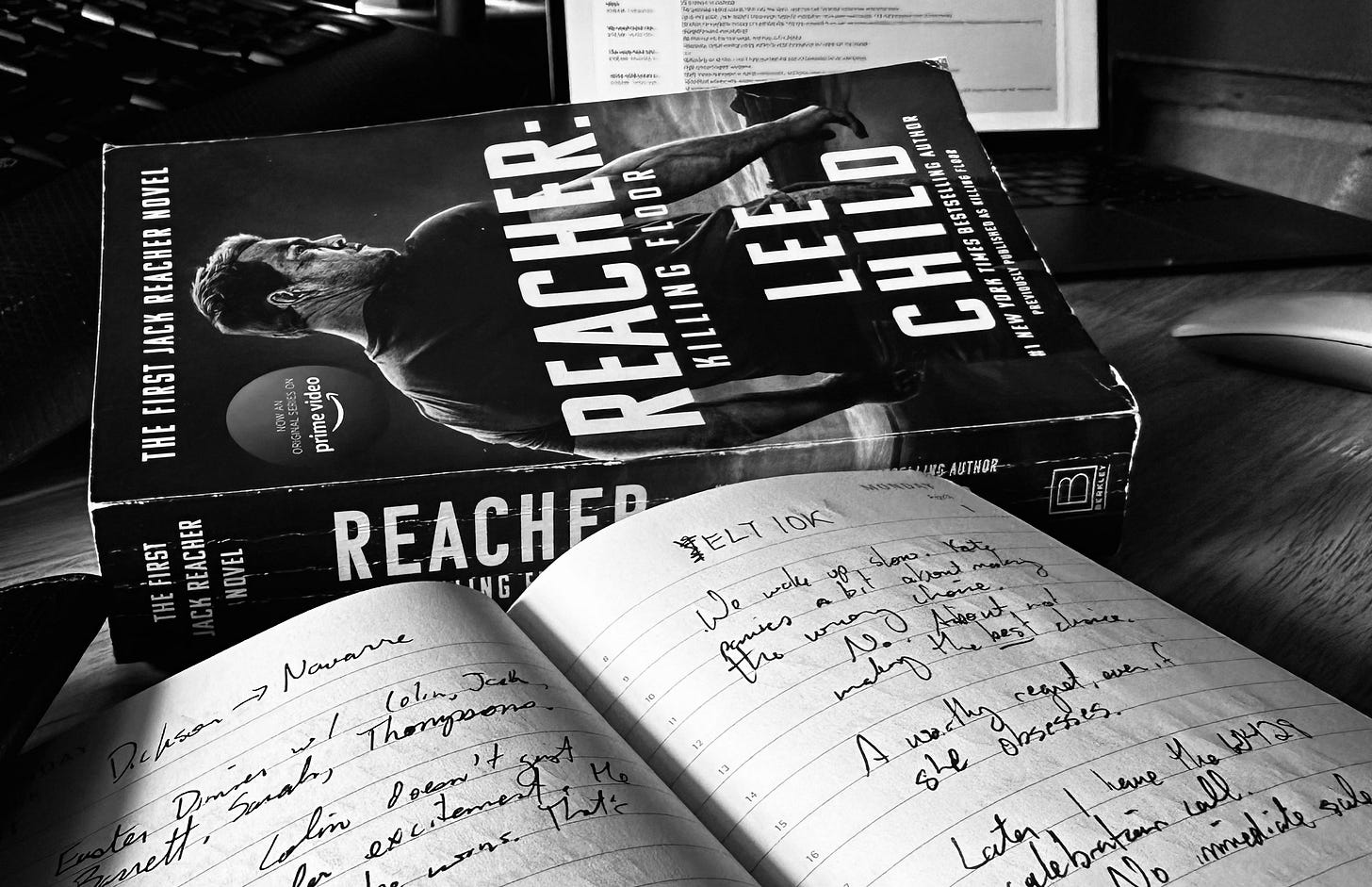think action books aren't well written? think again?
3 Writing Lessons from Jack Reacher
Growing up, I wasn’t the “adventure hero” kind of guy.
I played golf.
Sang in the choir.
Read poems with theatre kids.
Now, two decades later, I’ve found the joy of hyper-masculine heroes. Dudes who rush the scene, punch out the bad guy, and get the girl.
“Hyper masculine” characters are more than just actions, of course. You can’t understand a character without including the way an author presents him to you. The author’s writing voice helps you “see” the character.
John Green’s teenagers, are thoughtful, quirky, and honest because John Green’s sentences are thoughtful, quirky, and honest
Terry Pratchett’s monsters are chaotic, rambling, and hysterical because Terry Pratchett’s sentences are chaotic, rambling, and hysterical.
Lee Child’s hero — Jack Reacher — is a brutal, no-nonsense hero. So, guess what the sentences sound like?
Read these 3 passages from Reacher’s first novel, Killing Floor.
They hold keys to giving you writing a sharp and decisive voice.
Lesson 1 — Establish your style early
This is Jack Reacher’s first-ever paragraph.
Notice two things:
It’s first person narration (using the pronoun “I”).
The sentences are choppy, and often incomplete.
Your English teacher would scribble through this paragraph with red pen. 3 of these 6 sentences are incomplete. Meaning they are technically wrong.
But they are stylistically perfect.
Takeaway: Great writing doesn’t always follow the rules. After you’ve written something, read it out loud to see if it “feels” right.
Lesson 2 — Use More Nouns and Verb than Adjectives
There is only one descriptor in this whole paragraph. The word “one”.
No “sickening crack” of the fingers. No “agonizing scream” from the victim. Not even a “firm grip” around the hands.
In this style, there’s no need for that.
Reacher communicates everything with cold nouns and unfeeling verbs.
Takeaway: Great writing isn’t always flowery. Next time you write, try stripping out all the adjectives
Lesson 3 — Save your metaphors for when it counts
This is not a lesson in metaphor, really.
It’s a lesson in contrast.
Up to this point, Jack doesn’t have much need for metaphor. He is plain and simple. The stereotypical man of few words.
When he suddenly throws in a phrase like “the sky crashed in on me,” we know doomsday is nigh.
What could have possibly happened to drive reacher out of his straightforward storytelling?
We find out on the next page.
(And boy, is it a doozy.)
Takeaway: Great writing subtly shifts its style throughout to “wake up” the reader.
Reflecting on all this, I can’t help but feel a pang of sympathy for an odd group:
High school English students.
We stuff these teenagers in sterile classrooms and force them to read things like Faulkner, Fitzgerald, and Flannery O’Connor.
Yes, these are all brilliant writers.
All brilliant writers who mostly wrote things high school students are completely disinterested in.
Clearly Lee Child has created something great here too. A truth-seeking, justice-dealing, butt-kicking hero. He also deals with many of the “real life” themes that our traditional literary heroes address
“But Todd! High schoolers don’t read anyways!”
Yeah, well maybe they would if you gave them more interesting books.






I now want to read Jack Reacher books...great tip. So easy to go flowery to cover up lack of story too.
"Yeah, well maybe they would if you gave them more interesting books. "
EXACTLY!
And yet we English teachers are stuck with the same curriculum as always ... Thankful that's no longer my circus.